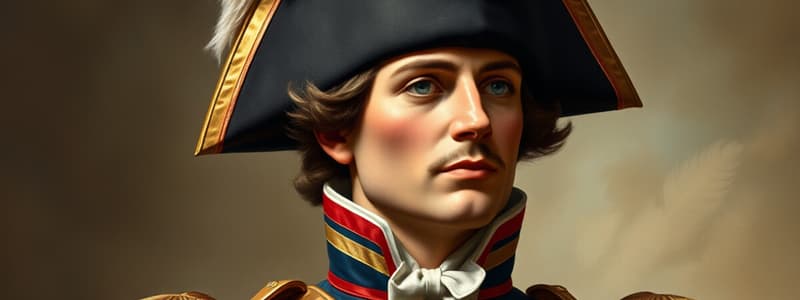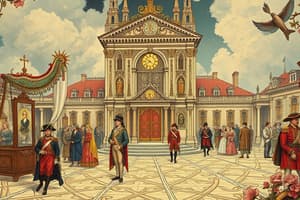Podcast
Questions and Answers
How was Napoleon able to come to power?
How was Napoleon able to come to power?
Napoleon rapidly rose through the ranks of the military during the French Revolution. After seizing political power in France in a 1799 coup d'état, he crowned himself emperor in 1804.
In 1812, what parts of Europe did Napoleon control?
In 1812, what parts of Europe did Napoleon control?
Napoleon controlled France, Italy, Kingdoms of Spain, and the Illyrian Empire.
By 1812, what parts of Europe were allied with Napoleon?
By 1812, what parts of Europe were allied with Napoleon?
Prussia, the Austrian Empire, and the Kingdoms of Denmark and Norway were allied with Napoleon.
By 1812, what parts of Europe remained free of his influence?
By 1812, what parts of Europe remained free of his influence?
Why did Napoleon divorce his wife, Josephine?
Why did Napoleon divorce his wife, Josephine?
Who did Napoleon marry after Josephine and what did he gain from the marriage?
Who did Napoleon marry after Josephine and what did he gain from the marriage?
Why did Napoleon attack Russia?
Why did Napoleon attack Russia?
What was the Continental System?
What was the Continental System?
What was the scorched earth policy?
What was the scorched earth policy?
What season did Napoleon retreat in?
What season did Napoleon retreat in?
What problems did the French army face during their retreat?
What problems did the French army face during their retreat?
How many men made up the Grande Army?
How many men made up the Grande Army?
How many men were in fighting condition after the retreat?
How many men were in fighting condition after the retreat?
What was the battle that the French were defeated at and by whom?
What was the battle that the French were defeated at and by whom?
Where was Napoleon exiled to the first time?
Where was Napoleon exiled to the first time?
When did Napoleon escape Elba and what did he do after his escape?
When did Napoleon escape Elba and what did he do after his escape?
Where is Waterloo and when was the Battle of Waterloo?
Where is Waterloo and when was the Battle of Waterloo?
Why did Napoleon lose the Battle of Waterloo?
Why did Napoleon lose the Battle of Waterloo?
Where was Napoleon exiled after his loss at Waterloo?
Where was Napoleon exiled after his loss at Waterloo?
How did Napoleon spend his last years?
How did Napoleon spend his last years?
How did Napoleon create a positive public image?
How did Napoleon create a positive public image?
What did the Napoleonic Code do?
What did the Napoleonic Code do?
What is Nationalism?
What is Nationalism?
What was the Congress of Vienna (September 1814 - June 1815)?
What was the Congress of Vienna (September 1814 - June 1815)?
Flashcards are hidden until you start studying
Study Notes
Rise to Power
- Napoleon emerged as a military leader during the French Revolution, rapidly ascending through the ranks.
- He executed a coup d'état in 1799, seizing political control and later crowning himself emperor in 1804.
Control of Europe in 1812
- By 1812, Napoleon controlled significant territories, including France, Italy, the Kingdoms of Spain, and the Illyrian Empire.
- Allied nations under his influence were Prussia, the Austrian Empire, Denmark, and Norway.
- However, the United Kingdom, Russia, Sardinia, and the Balearic Islands remained free from Napoleon's control.
Personal Life and Political Alliances
- Napoleon divorced his first wife, Josephine, as she could not provide an heir to secure his dynasty.
- He married Marie Louise, gaining Austria as a crucial ally and fathering a child, which enabled him to establish a hereditary succession.
Conflict with Russia
- The invasion of Russia was precipitated by their violation of the Continental System, as they traded with Britain.
- The Continental System aimed to weaken Britain's economy by limiting trade among allied nations.
Military Strategies and Retreat
- The Russians employed a scorched earth policy, destroying resources to deny access to Napoleon's forces.
- Napoleon's retreat took place during the harsh winter, facing extremely low temperatures and inadequate supplies.
- Initially, the Grande Army consisted of 600,000 men, but only 20,000 (3%) remained in fighting condition after the retreat.
Major Battles and Exile
- The Battle of Leipzig resulted in a decisive defeat for Napoleon, inflicted by a coalition of Russia, Prussia, and Austria.
- Following his defeat, Napoleon was first exiled to Elba, located in the Mediterranean.
- He escaped Elba in March 1815, reclaiming power in Paris during a brief period known as the Hundred Days.
The Battle of Waterloo
- The Battle of Waterloo occurred on June 18, 1815, in Belgium, where Napoleon faced defeat due to challenging conditions, poor tactics, and the arrival of Prussian forces.
- After this defeat, he was exiled to St. Helena in the South Atlantic, where he lived until his death six years later.
Final Years and Legacy
- In his later years, Napoleon focused on writing his memoirs, reflecting on his life and achievements.
- He cultivated a positive public image through control of the press, artistic representations, and military accolades.
Legal Reforms
- The Napoleonic Code unified France's laws into a coherent system, ensuring individual rights were codified and accessible.
Nationalism and Political Developments
- Nationalism emerged as a significant political ideology during this era, emphasizing the individual's identification and attachment to their nation.
- The Congress of Vienna (1814-1815) restructured Europe post-Napoleon, restoring monarchs and establishing a long-lasting peace in the region.
Studying That Suits You
Use AI to generate personalized quizzes and flashcards to suit your learning preferences.




